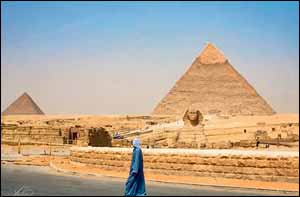 | |
| Why Israeli tourists had to remain silent in Cairo | |
Except that it was neither quick, nor easy. Our friends, when we told them of our plans, mostly thought we were nuts. “Why would you go to Egypt?” “Aren’t you scared to go to Egypt?!” “It’s dangerous for Jews in Egypt!” I asked my friend Muhammad, a Cairo resident, if it would be safe for us to travel there. “Absolutely!” he assured me. “Egypt is very safe! Just be sure you never mention ‘Israel’.” Not exactly reassuring, but at that point we were committed. So it was with slight trepidation, but mostly pure excitement, that we set off on our adventure. Over the course of the planned five-hour taxi ride from Taba to Cairo that turned into nine-and-a-half(!) hours, we discovered that keeping our Israeli connection under wraps would be difficult — since I kept on dropping words like “Israel”, “Jerusalem” and other dead-giveaways that Muhammad, our driver, surely heard. (Yes, most of the people we interacted with in Egypt were indeed named “Muhammad” with one spelling or another.) I continued to spill our Israeli beans throughout our trip. Luckily we never felt any less safe due to my verbal transgressions. Once in Cairo, every attraction we went to had signs that listed the price for “Egyptians and Arabs” and the price for “everyone else.” The difference for foreigners was often almost 10 times the price for Arabs! While I would not have blinked if the discounted price was for Egyptian citizens only, the fact that the discount was for an entire ethnicity felt incredibly strange and discriminatory. Imagine if Israeli attractions offered discounts to anyone who was Israeli or Jewish, or if American attractions offered discounts to anyone was American or white. You get the idea. Not wanting to truly give away our being Jewish or Israeli, we found it was very difficult to find some of the Jewish sites that were an important part of what we hoped to see in Egypt, since we were uncomfortable asking people where they were. And so we set off looking for the Rambam (Maimonides) Synagogue and some other Jewish landmarks with Google maps and a fair dose of optimism. Except that we could hardly find anything. Our first attempt brought us to an alley ending in a brick wall. So we walked around to where we thought was the other side and found a mosque. Further investigation led us to think the mosque had never been a synagogue, and we kept on searching. We went to numerous other possible structures, residential and otherwise, and even asked a tour guide, but the most we came up with were a couple of Stars of David on a building gate. An obscure website we found led us to believe that the first brick wall we found was probably covering one of the sites we had been searching for. But we did finally find a synagogue. It’s sort of the “Jew museum” of Cairo. The Ben Ezra Synagogue, aside from those Stars of David on a lone residential dwelling in Old Cairo, was the only Jewish structure we identified. The synagogue is the place where the Cairo Geniza (a collection of approximately 300,000 Jewish manuscript fragments, some dating back more than 1,000 years) was found. Locals also believe the location to be the place where Moses was pulled from the Nile. Even though the Nile was nowhere near the synagogue, it was actually much higher in ancient times, and flowed over the very spot where the synagogue was later built. But the most interesting thing for us was stumbling upon a group of young Egyptian students on a school trip there, perhaps seven to 10 years of age, who were learning about Judaism from their teacher. Upon further inquiry, we discovered that these students, clearly children of wealthy families, were on a special trip to learn about the three monotheistic religions. There was no negative subtext that we could discern in what the teachers were teaching. They just wanted their pupils to understand the different religions. It was strange and discomfiting to be standing in a synagogue, listening to an abstract lesson about Jews, while there we were — actual living and breathing Jewish people — and felt we couldn’t say a word. While Egyptians are by and large very friendly, there is a strange feeling of being an outsider beyond just being a tourist. And it wasn’t just the fact that random Egyptians on the street would ask to take a selfie with us, as if we were nameless celebrities or simply curiosities. Coming from the ethnic melting pots of Israel and America as we were, and especially as we were both Jews and Israelis, we knew that we could never truly fit in there, even if we wanted to. We did all the touristy things around Cairo: the pyramids, camel rides, the Nile, shopping in the Khan el-Khalili bazaar and souk (shuk), being scammed by ridiculously clever con artists. We were seeking adventure and we found it in spades. We were looking for signs of the rich Egyptian Jewish heritage and found it sorely lacking. We were hoping for a memorable journey, and that is indeed what we had.
If you have a story or an issue you want us to cover, let us know - in complete confidence - by contacting newsdesk@jewishtelegraph.com, 0161-741 2631 or via Facebook / Twitter

|
 A camel ride and the pyramids were on the itinerary for Laura Ben David
A camel ride and the pyramids were on the itinerary for Laura Ben David